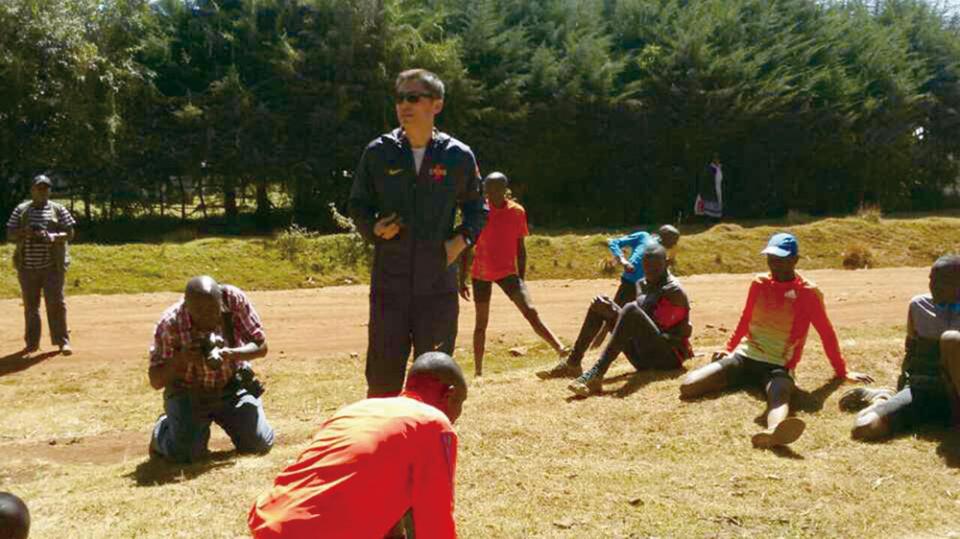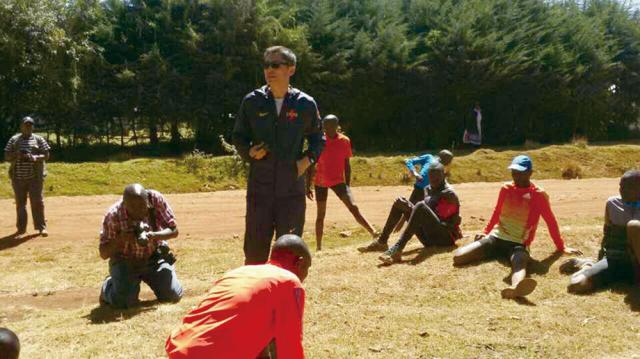The development of China’s burgeoning marathon scene has accelerated in the past few years, and the fame of Tao Shaoming has shot up with it. The 51-year-old former Chinese national team coach became the first Chinese to open a marathon training camp in Africa, and now his athletes are cleaning up at Chinese events. One of his runners won the men’s division of last year’s Beijing Marathon, while his athletes secured five at the six podium spots in April’s Wuhan Marathon – the only spot they missed was women’s bronze.
Tao currently operates six “Tao Camps” located in Kenya, Ethiopia and Uganda. Over 300 African marathon runners are training under his tutelage.
Tao is confident that his athletes’ successes this past year are just the beginning. “We can guarantee we’ll nab at least one first-place win this year” at the Beijing Marathon, Tao told NewsChina. “No matter if it’s the men’s or the women’s – we expect it.”
Running Start
When Tao opened his first marathon training camp in Kenya four years ago, marathon culture had barely reached the starting line in China. There were only 33 marathons in the entire country in 2012. (The US hosted about 850 marathons that same year, according to the nonprofit Running USA’s 2013 Annual Marathon Report.) Tao said that he first came up with the idea of opening a training camp in Africa more than a decade ago, when he was a marathon coach for China’s national team. At that time, he often traveled with Chinese team members who were running in events overseas. He observed the mature sports agent industry in Europe and the US, as well as the superb performances of African athletes, and was deeply impressed.
“I just wanted to see whether a Chinese coach could successfully train African athletes, and what level I could attain,” he told NewsChina.
Tao first started coaching in 1989, shortly after graduating from Shanghai University of Sport. He joined the national team in 1995. After seeing that elite athletes could earn high appearance fees (financial incentives just to participate) and prizes from sponsored competitions, he came to realize that he could do more than simply train athletes.
“I met agents in Europe and got to know their roles and backgrounds. I thought [Chinese agents] could do the same things they’re doing, it’s just that we didn’t have the same platform,” he said.
In 2010, he left the national team and moved to East Africa to try his hand at becoming a professional agent for marathon runners. Interest had swelled after Kenyan runner Samuel Wanjiru won the 2008 Beijing marathon. Since the 1980s, coaches from Europe and the US have come to this region that is renowned for its long-distance running talent, opened up running camps and trained many successful athletes. To date, there are more than 300 private running camps in East Africa.
Tao established his own camp on a plateau about 250 kilometers away from Nairobi. He told our reporter that only a handful of people can open and maintain training camps in Kenya because of immense investment costs, bureaucratic red tape and management difficulties.
“When you make this investment, sometimes it yields returns and sometimes it ends up being a total failure,” he said. “Many people cannot afford it.”
But African runners are keen to get a piece of China’s burgeoning marathon market for themselves. “China is a game changer,” Kenyan coach Philip Kiprono told the China Daily in 2015, saying that prize money was bigger than in Europe, while the relatively low benchmarks allowed newer runners to start their careers easily.
Tao established his camp near a concentration of villages. Local residents who excelled at running, including farmers and nurses, stopped by for tryouts. Because of Tao’s relatively late entry into the Kenyan running world, the area’s top athletes had already signed with other agents. Instead of banking on the region’s best, Tao had to keep an eye out for younger runners with hidden potential.
Tao provided his athletes with room and board, as well as professional coaching. He took them to participate in races around the world. Tao’s first camp roster soon boasted over 100 names because he gave his athletes plenty of opportunities to race and did not withhold their share of the winnings. In some impoverished regions in Africa, marathons have become a prime opportunity for locals to change their lives. To athletes whose families may earn less than US$1,000 in a year, potential race earnings of US$10,000 or more can be very attractive. The biggest races dangle extremely large wads of cash in front of participants - the male and female winners of the Boston Marathon take home US$150,000 each.
Big Prizes
In the run-up to many major marathons, organizers invite a certain number of elite athletes and cover their transportation costs and accommodations. These athletes get appearance fees, as well as any winnings they might earn from the race. Athletes’ agents tend to take a cut of about 15 percent of this cash.
To ensure that they are in peak physical shape when racing, top athletes may only run in two or three marathons a year. This makes it crucial for their agents to carefully consider their race selection.
Tao’s team attends more than 100 races every year. About half of those take place in China. For each race, he carefully checks his athletes’ individual training data, then registers them for different races based on their past performance.
Tao has several resources at hand that are unavailable to many of his peers overseas: his more than 20 years of coaching experience, a wide athletic network and his knowledge of China’s booming marathon scene. The country held 134 officially registered marathons in 2015, according to the Chinese Athletic Association, up from 51 in 2014 and 13 in 2010.
Tao said his athletes prefer to run marathons registered with the Chinese Athletic Association because they offer the biggest purse available at Chinese races – US$40,000. However, he has also entered runners in some poorly managed events that do not attract top competitors simply for the prize money.
Although China’s largest marathons, which typically take place in Beijing, Shanghai and Guangzhou, offer smaller cash prizes than the biggest global races, Tao still values them greatly because they help him preserve a media presence in his home country and maintain marketability. “My priority has always been the Beijing Marathon,” he told our reporter.
It was the Beijing Marathon in 2013 that first brought Tao fame. At that time, more and more marathons were popping up across the country, so the Beijing Marathon’s organizing committee was facing increasing pressure from other cities to up its game. Committee members came to Tao for help. To increase media exposure, they wanted to invite top talent to beat the event’s course record of two hours, seven minutes and 35 seconds, set by Japanese athlete Taisuke Kodama. It had remained undefeated for 27 years.
Tao contacted three overseas agents and together they selected six top athletes they believed had a chance of beating that time. In the end, all three medalists broke the record and the second- and third-place winners were two Kenyan athletes from Tao’s team.
“Although we didn’t take first place, it doesn’t matter,” Tao said. “At least I gained recognition for my professional abilities.”
Controversies
As one of the first agents to dominate marathon races in China, Tao is often met with criticism from domestic agents and coaches. They chide him for making a fortune off the backs of African athletes and “stealing” medals and awards away from Chinese runners. Tao said that he is unable to communicate with his counterparts in China because they are really “unprofessional.”
“Why have I nabbed more wins than you?” he said, addressing his critics. It’s because “I control my athletes, I understand their training regimens. If I showed you data you wouldn’t even know whether or not the runner was good.”
Tao repeatedly emphasized how important professionalism is in his industry. He said that the “demand” for elite African runners in China has risen along with the sport’s popularity, which has led a growing number of agents to enter the business.
In the opinion of Li Zicheng, a former marathon runner for China’s national team, it is increasingly difficult for Chinese athletes to compete with African runners; in major Chinese marathons, it is virtually impossible for Chinese competitors to finish within the top eight.
Li Shaozhuang, an amateur marathoner famous within Chinese running circles, told NewsChina that during a half marathon in Shanghai this year, he was surprised to see some African athletes participate even in the non-elite category.
African runners argue, however, that their participation is forcing Chinese athletes to raise their game in a way that benefits the whole sport. “Although competition is still a little low in China, I believe with the inclusion of Kenyan and Ethiopian athletes, it will improve,” another Kenyan coach told China Daily in 2015.
“If it’s a competition, it has to be internationalized, it has to have foreign participants,” former pro Li Zicheng said. According to him, agents frequently send foreign athletes to China to participate in small-scale races that have invited them in the name of internationalization, then arrange for their athletes to run in many other local races just for the winner’s purse. “We’re not targeting African competitors, we’re targeting this kind of madness,” Li added.
Some in the running world worry that China’s booming marathon market has failed to motivate and cultivate domestic talent. Organizers of some newer marathons have prioritized internationality so intensely that the quality of basic event necessities, such as security and medical facilities, has been allowed to suffer.
Tao told our reporter that there are currently only a small number of professional Chinese marathon runners, roughly 40 to 50. Of them, no more than five men and six women can compete at an international standard, he said.
He said that even though there is a gap separating Chinese athletes from some of their foreign peers, China’s growing presence on the world stage gives the country’s athletes more cachet. Marathon organizers in Europe and the US would like to see more Chinese faces on the track.
Tao said his next plan of action is to hire famous foreign coaches to come and train Chinese runners. In the coming years, “maybe some athletes trained by my team in China will participate in the Asian Games, the [International Association of Athletics Federations] World Championships and the Olympic Games,” he continued. “This is my goal, and I will definitely see it realized.”

 Old Version
Old Version
